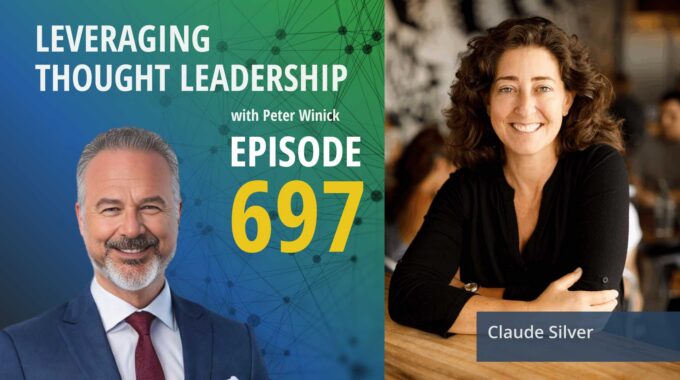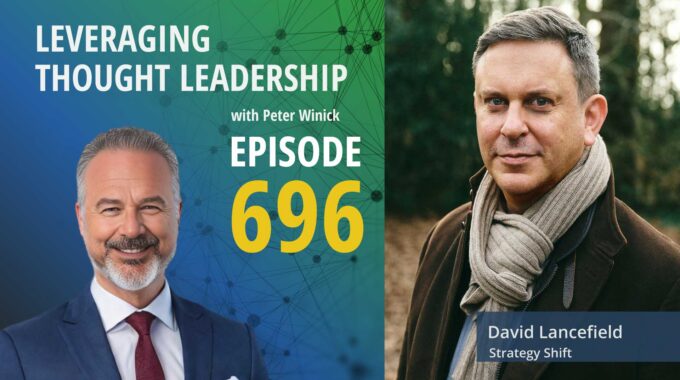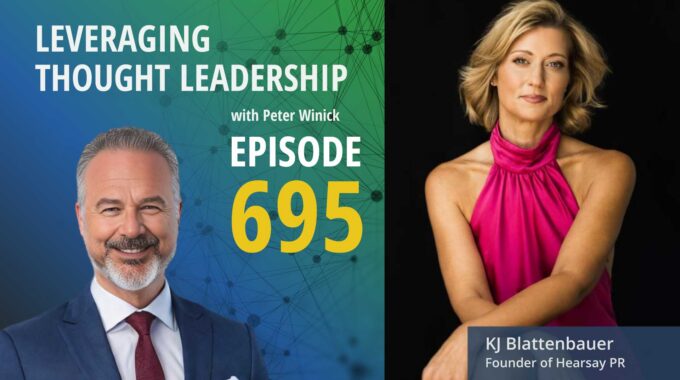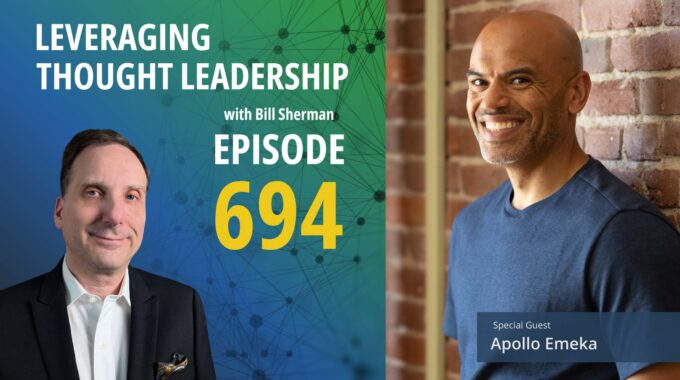Frameworks for connection, accountability, and performance This episode examines how psychological safety drives performance, how…
Leveraging Thought Leadership With Peter Winick – Episode 98 – Tess Woods
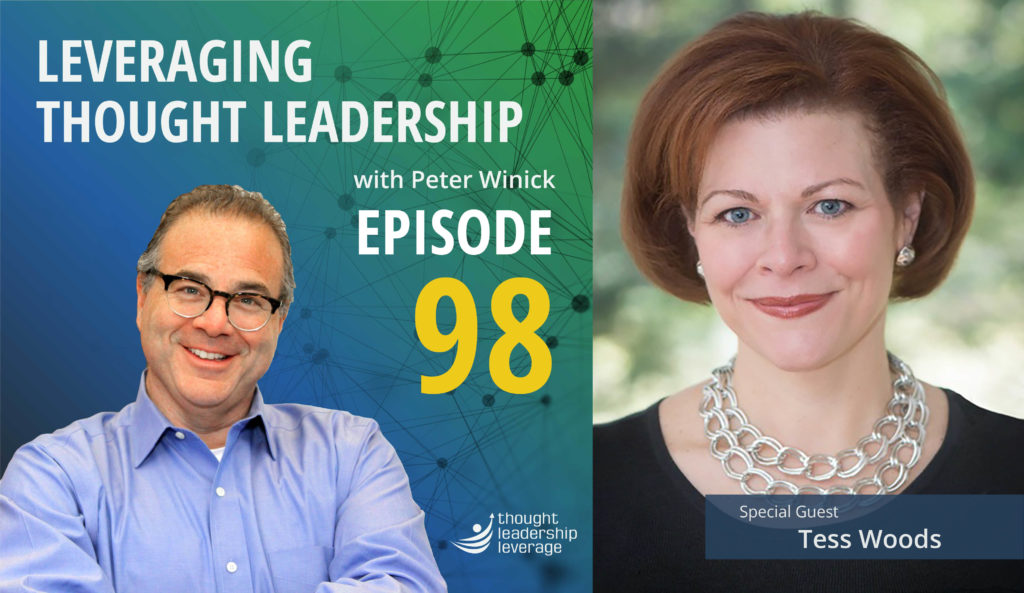
Writing a book can be hard, but selling a book is even harder. That’s why a lot of thought leaders hire specialized PR talent to help them out. But what questions should you ask before you hire?
Our guest, Tess Woods, is an entrepreneurial leader with 20+ years of experience in strategy, branding, thought leadership, and hands-on campaign development. Her work has been featured in The New York Times, Bloomberg Business Week, and Forbes.
Peter and Tess discuss setting practical expectations for sales. She explains how to create a marketing plan, and why you should be building your followership well in advance. Along with those topics, Tess gives expertise on finding a PR person that will fit your needs, understand your genre, and write to your best market.
If you want to understand why a “best-selling book” isn’t necessarily the only benchmark of success, you need to listen to this episode!
If you need a strategy to bring your thought leadership to market, Thought Leadership Leverage can assist you! Contact us for more information. In addition, we can help you implement marketing, research, and sales. Let us help you so you can devote yourself to what you do best.

Transcript
Peter Winick And welcome, welcome, this is Peter Winick. I’m the founder and CEO of Thought Leadership Leverage, and you’re joining us today on the podcast, which is Leveraging Thought Leadership. And today my guest is Tess Woods. Tess is about as experienced as they come in terms of a PR person that focuses on business books. And without getting her too embarrassed, let me just drop a couple names of folks that she’s worked with. So on the publishing side, it’s everything from Josie Bass to Harvard Business Press to McGraw Hill. To the thought leader and interesting people side, we’ve got, let’s see, who do we have here? We’ve got Tim Russert, Dan Schwebel, Keith Ferazzi, Whitney Johnson, Rudy Giuliani, before he turns insane, John Maxwell, Charlene Lee. So I’ve known Tess for a long, long time, and there are a few people that are more knowledgeable around the PR side of launching a business book than Tess, so Tess welcome aboard.
Tess Woods Thank you, very kind introduction there.
Peter Winick Thank you. So why don’t we start with, let’s just sort of dive into it. So we’re both privileged that we work with really, really smart people that are passionate about what they do. And we do what we do from sort of different angles, but I think through a similar sort of lens of how we try to help folks, what are the things that you see folks do, maybe first time author, even more experienced author, as it relates to PR that are detrimental, what are things that they can see them do that are helpful?
Tess Woods Well, yeah, I hate to start with the negative, but well, we will um things that I find most detrimental especially a first-time author is Expectations or not asking the right questions soon enough of their publisher or of of themselves if they’re self-publishing A self-Publishing a book is very expensive and it doesn’t just happen I often say, you know you you put all of your energy into writing this book. It’s like you just birthed a baby but now comes the hard part where we have to raise that baby.
Peter Winick Exactly.
Tess Woods It’s not over, and sometimes those first time authors kind of think, okay, I’m done. Yep. Let it go.
Peter Winick Or they think the hard part is writing the book, right? They think the harder part is writing the books, and that’s just the beginning of the next phase. As you said, it’s not the end of it, right. You can’t just hand that off to your publisher if you’re not self-published. Even if you are, in most cases, you’re still gonna be largely responsible for the success of the book. I wanna talk about what you talked about because I think it’s critical in terms of expectations, and I find it incredibly all too frequent and sad when I’m talking to a first-time author, maybe it’s six or eight months after they’ve done their book. And they’re really, really upset, depressed, sad around what did or did not happen relative to their expectations. So how do you have that conversation? What are realistic expectations?
Tess Woods Well, clearly, I mean, every case is different, but to have the talk with an author, whether you’re in-house at the acquiring editor level or someone like me who’s out of house on the PR level, to really understand their goals of writing a book, number one, and then to make sure that reaching those goals is attainable. And by doing that, we have to set those expectations. I’ll have authors call me a week before pub, which is too late most of the time. and they’ll say, I want this best seller.
Peter Winick Thank you. Bye.
Tess Woods And it’s like, do you understand what that word means? I almost cringe. A lot of the times the publishers aren’t even printing a print run that would make it a best seller. And it takes a lot more than just hiring a publicist a week before pub to help make that happen. And I think that some really honest conversations.
Peter Winick So I want to go deeper on that two elements that you brought up there. One is timing because you know if your book’s coming out May 7th and it’s the first and you decided to call Tess, you know good luck with that. There’s things that you can do but you’ve limited her. But I also want to talk about A, let’s talk about timing and B, this whole bestseller thing, right? So it wasn’t that many years ago where it was fairly easy to buy your way on the list or manipulate your way onto the list and people would do that I think for you know it was either ego or you could see a return on investment I’m a $20,000 speaker if I get New York Times bestseller and go to 30. Give us the skinny on both of those if you could like when’s the perfect time to start thinking about PR and calibrate our expectations around what it really truly means to be a New York Times or Wall Street Journal or whatever bestseller.
Tess Woods Well, not talking about the bestseller here. Not every business book is intended to be a bestseller. Most paperbacks, most smaller publishers, niche areas of coverage. Someone who writes a book about mergers and acquisitions likely not going to be bestseller because their audience is quite niche. But there is an audience. It’s just not the sexy audience that they expect. You know, I remember an author who said, Oh, my sisters, cousins. Uh, babysitter’s daughter is a producer for Oprah back when Oprah had her show. And, and I heard if we can get on there, we can have a best seller. And again, that was that mergers and acquisitions book. It’s like, you could ghost it on Oprah’s couch with your book. Your audience is not going to buy that. So really the expectations, some, I mean, that was one extreme clearly. But really, a lot of times the goal of a business book author is not necessarily the bestseller list. It is to get that next client, to get that next speaking gig, to raise their platform, or to get the publisher if they’re self-published. So really, lot of them do have their expectations in check. And just explaining the process to them helps not only keep their expectations in the know, but to help propel them to the next level, where Perhaps the next book could be a bestseller.
Peter Winick Well, even the bestseller thing, so just from a nuts and bolts piece, what that means typically by definition is in a week’s period of time, you sold plus or minus 12,000 books across the various channels. That’s the definition, right? And 12,00 books, given that the average business book sells about 2,000 copies, is an extraordinary amount. And there are several variables that go in that. If you happen to be releasing against a Malcolm Gladwell or something. bad, right? It’s like opening a movie against Star Wars, right. And if you’re not coordinating the efforts, right, so if you have a large followership, if that’s a word, right so if this is your second or third time out of the gate, you need to coordinate that and not leave it up to hope, you know, or chance. And you know there are less. opportunity to sort of jig those lists in the last five or six years where, I mean, people are literally buying, you know, seven or eight thousand books and scoring them in Iowa or something like that. That’s number one. Spending hundreds of thousands of dollars, yes. Hundreds of thousands. And quite frankly, there’s no ROI on it. The reality is the average people. No, none at all. Yeah. So I mean the average business book today hangs on the list for like under two weeks. Ten years ago, it used to be 30 weeks. So if you do the math supply and demand. It’s almost like every book’s a bestseller, so it doesn’t mean as much to the audience. I think some of that is ego. I love what you said before around the expectations are, you know, that M&A book that you mentioned. Yeah, that’s probably not going to be a best seller. It’s not going, you don’t know, not good to great off the off the list. But the expectations could be. Whoever wrote that, maybe they get two or three clients and they’re seven-figure clients, and it was worth the effort. Maybe they’re doing speaking gigs. So it’s really about calibrating what success looks like for you and don’t use the same yardstick for everybody else. Cool.
Tess Woods Everybody’s goals are different and many business people don’t come out with a business book with the goal of a bestseller I mean if that happens wonderful, but a lot of them do go out there. It’s their calling card It’s something to leave behind It’s Something to get them to the next level to increase that speaking fee And if they can get two speaking gigs out of it, it most likely paid for itself paid for me. Yeah
Peter Winick So give me a sense, if I were an author, and I’ve got a book coming out, you know, the next year, and I’m going to start interviewing PR firms that people mentioned or I searched or whatever, give me sort of three questions or something that I should ask of you or folks like you to see if it’s a good fit. Because it’s got to be a good fit on both sides, right? But how do I know sort of what’s a good way to tell if I’ve gotten some really talented PR resources that I could be working with?
Tess Woods Well, I would ask number one about the PR person’s background. Do they have experience in this genre, whether you’re an entrepreneur, author, or an author talking about women in business or marketing, any of those things? Have they had experiences and successes in those areas? Another topic would be who’s in your firm? Is it you that I’m going to be dealing with who’s going to be representing me or is it going to be someone else and who is that?
Peter Winick So let me break those two things apart for a second though. So the first thing is you have been in the business book space for a long, long time. I’m going to tell how many decades that gives me a lot of comfort. I’m still 23. Right, right, right. You were ageless, obviously. Right. Right? I was going to say 24, but okay. But so number one, your book, what’s our model book, right? Your business book person. If someone’s been successful in cookbooks, children’s books, whatever, that’s all fine and dandy. totally different planet. Absolutely. So I just wanted to touch on that. And then the who question is really important because you have some big New York and other firms where there’s some brand name rock star and like in a lot of professional services, businesses, unfortunately, then you get stuck with disrespectful to the junior staff. But, you know, the 25 year old that’s been around the block for a year and you’ve written more books than they’ve read or something. Not a good thing.
Tess Woods Exactly. And to find someone who’s in your niche is so important. I mean, I know there’s lots of generalists out there who do great jobs. But to be frank, to do a business book is much different than to do. A literary book or a cookbook or a children’s book. We all know each other, honestly, and we refer people back and forth all the time. I would never take on a fiction book, but I could tell you three people who you could call to consider. And it really is transparency, and hopefully you can gage that from a conversation with the PR person on the other side. And if you can’t, then maybe ask for a reference or some samples of past campaigns in that area as a way to gage whether it is exactly what you’re being represented.
Peter Winick So on the reference side, and this is something I’d love to get your take on, oftentimes new authors or newer authors can get somewhat enamored by folks that a PR firm or anyone else has worked with. So the fact that you’ve worked with, I don’t know, pick a big Whitney Johnson or Charlie Lee or some of these amazing, amazing names, and you’ve achieved success for them doesn’t necessarily mean like, I couldn’t compare myself to Whitney Johnson if it’s my first book out of the gate. So talking about that, because that’s the first time out versus a rock star.
Tess Woods No, and I say that, you know, we put the big flashy names in the bios and on the websites and LinkedIn, and those are the ones you’re attracted to. But for each one of those Whitney Johnsons, there’s three others you’ve never heard of, who I’ve been able to help increase their coverage, their platform in their specific areas. It’s a good balance from my side to have a rock star like Whitney Johnson last summer, because it keeps the media relationships that I have out there paying attention. It gives them, oh, you covered Whitney, now let’s cover Joe Smith, who you may not have heard of, but now you trust me that I only give you good things.
Peter Winick And I think also the measure is if my starting point as a newbie is basically zero, I’m an unknown author, it was my first time out of the gate, and you can get me to X. And as long as we’re clear together, like that X might be filled a few books, I’ve gotten a few gigs, you know, there’s a long term play, not that in 90 days you can turn me into Jim Collins, right? Right. Because I hear people all the time work with me like, okay, what do you want, give me something that you think you could model on the speaking side, you know, Tony Robbins. Okay. Right. Dude’s been doing it for 30 years. And it wasn’t 90 days. Yeah, exactly, exactly. So, okay, that’s cool. Anything else I should be thinking about when…
Tess Woods looking at PR? I think those are the two biggest things to ask. And really, to ask what the in-house publisher plans to do. You don’t want to open your wallet if you don’t have to. Honestly, I’m very protective of that. But more and more, the publishers are being very transparent and suggesting that authors hire someone from the outside to compliment them or to do things that they no longer do in- house. It’s just been a shift in the whole process. of publishing in the past years. Good for me, not necessarily for the author.
Peter Winick So I’d love to get your take on some things that we’ve seen, and we have a weird vantage point because we work with a lot of the same types of folks that you do, is the days of going for the home run play, which is, you know, I want to get on the Today Show. I want get on Oprah. I want a New York Times book review and all that stuff. Those days are kind of over, you now, because quite frankly, we both are lots of folks that have done the New York times book review, and have sold 80 books. It doesn’t really work anymore. And I think oftentimes clients get disappointed, whatever, when you say it and listen. I want to do some micro-targeting for you. So if you use your M&A book as an example, that’s not a general purpose book. Maybe they’re target audiences or private equity firms or managing directors of private equity firm. There’s only 700 of those people on the planet. Talk to me about sort of micro- targeting and the impact of that.
Tess Woods Well, and it’s funny. Everyone has their definition of sexy, right? And I was even talking to an academic yesterday about a new book coming out about crisis management and crisis communication. And you know what? Knock on wood, there won’t be a big crisis. That’s how he’s gonna get on the front page of the news if there is, and he can be the topic. Barring that, and of course, we’re not wishing for a crisis. It’s not gonna be the sexy stuff that really picks it up. It’s gonna be the HR publications, the leadership publications, the PR publications, those sorts of things. But they’re the right target for him.
Peter Winick Right. And they may be sort of to the lay person boring, whatever, whatever. But in certain industries, if you get into the right trade journal or whatever, whatever, that’s a big deal. It’s more.
Tess Woods And those trade journals, while they’re not sexy, they’re so specific to you that it could become the next big speaking gig at that trade show. Got it. And then there you go, that snowballs into the new client and into the next client and the next speaking. And maybe you sold five books.
Peter Winick No, there’s a room that’s rich with prospects. Other topic I want to touch on, and this is sort of a sore spot for a lot, is … is to build it before you need it. So the big publishing houses, you might have a different opinion when they’re evaluating a book, they’re looking at obviously, is it great content? Does this person have someone to say, is aligned with the needs of the market? But they’re also definitely doing a pretty in-depth analysis of your platform in terms of your followership and all that stuff. And the time to build that is not after your shopping proposals, so can you talk about how critically important that is in terms of getting your message out?
Tess Woods It is, I mean, you could have the best thing to say and a publisher is gonna really hesitate if nobody knows who you are. And by nobody, I really mean just your mom. I mean you need to have the social media following. You need to some articles published. You need have all of the marketing pieces in place for your company or your organization or things of that nature so that you really can go to them and say, here’s my built-in audience. I’m gonna be speaking at these five places in the next month. I’ve got public, I’ve been quoted in X, Y, and Z. I’ve done public in ABC, all of those things so that they can say, okay, I can sell this book. I often tell clients, you know, the first thing I do when someone says, can you represent my book? First thing I’d do is I flip it over and I read that author bio. I don’t even look at what it’s about. Can I sell the first?
Peter Winick Thank you.
Tess Woods and who they are. So really I’m looking at the platform, then I go and look at the message and see how can we make this fit into the media world.
Peter Winick Yeah. Well, and there’s, I mean, there’s an argument to be made that with a big enough platform, someone could almost sell anything. We don’t want to go there. How far in advance do you think it is important to create that platform? So most people don’t think five years out, like in five years from now, I’d like to write a book therefore. So how do you sort of process that.
Tess Woods Well, I mean, it depends. Everyone is different. Obviously, if you’re a business author, most likely you’re an executive, a consultant, you have some sort of business going. So what you should be doing all the time, honestly, is getting your name and your business out there with your ideas to all those things we just talked about. As we get closer to the book that you want to start, you know, oh, in my forthcoming book, I’m going to talk about this and kind of pepper it out there, tease it out. there. You do wanna kind of go a little bit quiet right before the book comes out. Sure. But you should have done a whole bunch before that little quiet period.
Peter Winick Got it. Any thoughts or advice? Because I think this is where people get overwhelmed because they sort of take a look at the social world and they say, oh my God, there’s Instagram, there is Twitter, there is LinkedIn, there are Facebook, like, ah, I don’t know where to start. So they don’t do anything. So if you were to say to them, listen, if you’re only going to spend, you know, an hour or two a week on social, from your experience, the highest return or the most impactful is X. Or is that not an answer? Thanks for watching!
Tess Woods I mean, I deal with business authors. So for the business sphere, LinkedIn I think is the best way to not only grow your own network, people who are attracted to you, but then for you to find the likewise, those that are attracted in the opposite direction so that you can benefit both ways. I mean there’s a Twitter feed on LinkedIn now. I find that way more useful than Twitter. There’s many people who would disagree with me. If you have a Twitter following already, I say that’s great, use it. But as we all know, there’s lots of noise going on Twitter about lots of other things. But LinkedIn is really very focused in the business space, which is where most of my clients are as well. And honestly, they’re gonna get the more serious person looking.
Peter Winick I would just add to that, that in the classic quote of the consultant, it depends. that oftentimes, if your content, let’s say you’re dealing, your content is management for millennials or Gen Y or whatever, it may be a little more Instagram-y, right, if you’re a little bit more visual, if you are in the innovation or the creative space. But lots of block and tackle business books don’t translate well to Instagram in terms of the punchiness and the image and all that. But if you were in the creativity space or innovation or something sort of cooler or funkier or whatever. So this has been awesome, Tess. I’m so glad that you joined us today. chock full of information and any last nuggets you want to sort of throw out there either as positives or warnings of landmines to avoid.
Tess Woods No, I think, I mean, just make sure your goals are aligned with those you hire, with those you’re seeking to help you so that you don’t get disappointed and that you do reach those goals or have a clear idea of how to get to those goals. So anyone you speak to, whether it’s someone like you, Peter, or someone like me, or even an acquiring editor or an agent, just makes sure they understand what it is you want from this, whether its to be that flashy best seller or to really just gain the next client.
Peter Winick Got it. We’ll put all of Tess’s contact info and details in the show notes here. And I would strongly suggest that if you’re thinking about hiring a PR firm, that she be one of the first, if not the first that you call. Oh, thank you so much. Thanks for joining us today, Tess. This has been awesome. And we will talk again soon.
Tess Woods Thanks, Peter. It was fun.
Peter Winick To learn more about thought leadership leverage, please visit our website at thoughtleadershipleverage.com. To reach me directly, feel free to email me at peter at thoughtleadershipleverage.com And please subscribe to Leveraging Thought Leadership on iTunes or your favorite podcast app to get your weekly episode automatically.


